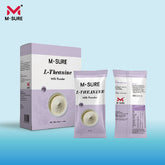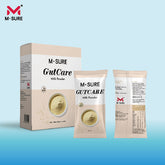Comprehensive Calcium Supplementation Strategy for the Elderly
by
BiotechAusway
15 Jun 2025
I. Scientific Calcium Supplementation Strategies
Calcium-Rich Diet Priority
-
Dairy:
Aim for ≥300 ml of milk or yogurt daily.
Lactose-intolerant individuals can opt for low-lactose milk or calcium-fortified soy milk. -
Plant-Based Calcium Sources:
Tofu, sesame paste, dried shrimp
Avoid consuming these with high-oxalate foods like spinach, which can inhibit calcium absorption. -
Synergistic Nutrients:
-
Vitamin D: 15–30 minutes of daily sunlight exposure, or dietary sources like deep-sea fish and egg yolks
-
Vitamin K₂: Natto and fermented dairy products support calcium deposition in bones
-
Precise Calcium Supplementation
-
Supplement Types:
-
Calcium carbonate: Suitable for individuals with normal gastric acid
-
Calcium citrate: Recommended for those with low stomach acid or a history of kidney stones
-
-
Dosage:
Total daily calcium intake should not exceed 2,000 mg, paired with 600–800 IU of Vitamin D₃ -
Contraindications:
-
Limit intake of coffee, strong tea, and carbonated drinks as they can increase calcium loss
-
Avoid taking calcium supplements alongside high-fiber foods, which may reduce absorption
-
II. Lifestyle Optimization
-
Sunlight for Vitamin D:
Expose arms to sunlight for 15–30 minutes daily, preferably before 10 AM or after 4 PM -
Weight-Bearing Exercise:
Engage in 30 minutes of daily brisk walking or Tai Chi to stimulate bone-forming cells (osteoblasts) -
Calcium Retention Habits:
-
Quit smoking
-
Limit alcohol consumption
-
Drink milk before bed to reduce overnight calcium loss
-
III. Medical Support & Risk Mitigation
Essential Testing
-
Annual bone density scan (DXA)
-
Periodic blood and urine calcium monitoring to prevent hypercalcemia
Pharmacological Intervention
-
Severe Osteoporosis:
Treatments such as Alendronate or Raloxifene may be prescribed following medical evaluation -
Combination Therapy:
A triple regimen of Calcium + Vitamin D₃ + Vitamin K₂ can enhance calcium absorption and bone deposition
Risk Alerts
-
Avoid self-administered calcium injections, as they may cause arrhythmias or kidney damage
-
Bedridden individuals should be repositioned regularly to reduce the risk of disuse osteoporosis






